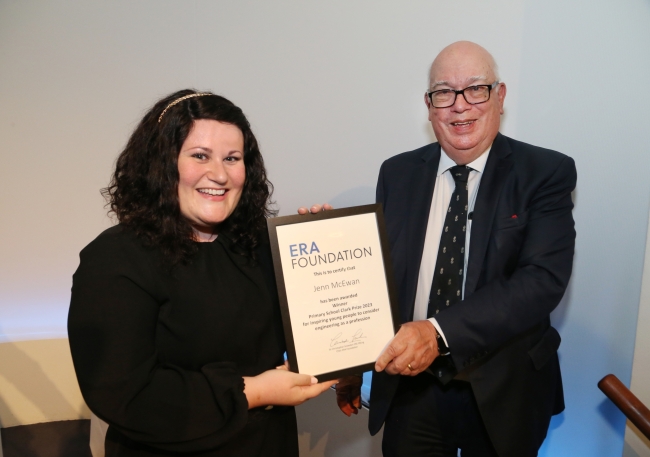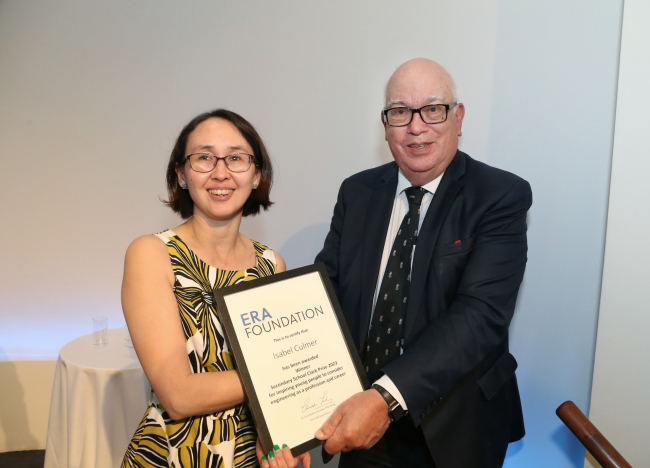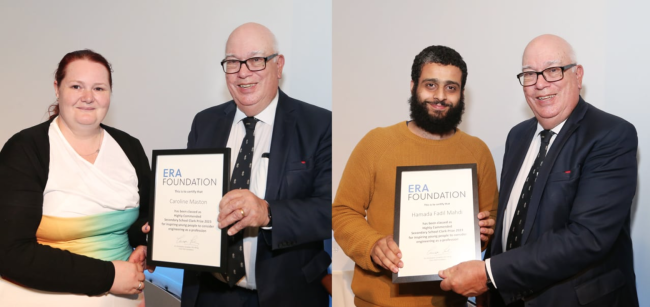5 minute read - 15th June 2023
The ERA Foundation awards recognise teachers who showcase real-world engineering in the classroom
The ERA Foundation has announced that this year’s Primary School David Clark Prize will go to Jenn McEwan from Doonfoot Primary School and the Secondary School Prize will go to Isabel Culmer from Barton Peveril Sixth Form College.
The prize recognises teachers who have gone beyond the teaching syllabus and demonstrated a strong track record of showcasing real-world engineering to students while inspiring them to consider engineering as a career.
The awarding team agreed that Jenn and Isabel had shown an extraordinary vision for engineering and a high level of creativity in their work with young people.
Alongside Jenn and Isabel, the ERA Foundation also recognised Caroline Maston from Lighthouse School and Hamada Mahdi from the London Academy of Excellence Tottenham with Highly Commended status. They have both promoted and excited children about engineering in challenging circumstances. Caroline works with a range of neuro-diverse children, and Hamada works in a school in an area with high levels of deprivation.

The 2023 David Clark Prizes have been awarded to Jenn McEwan and Isabel Culmer, two exceptional teachers who have gone above and beyond the curriculum to inspire students and showcase real-world engineering in the classroom / Picture: The ERA Foundation
Jenn McEwan
Jenn McEwan, the Lead Science Teacher at Doonfoot Primary School, has been a beacon of inspiration for her students, actively engaging them with engineering for the last 12 years. Not only has she made a significant impact within her school, but in her development role as local authority STEM Lead covering forty one primary schools, their associated Early Years Centres, eight secondary schools, and two Additional Support Needs Schools in South Ayrshire, Jenn has extended her influence, providing opportunities and engagement for young people of all ages with engineering.

Primary School David Clark Prize winner Jenn McEwan from Doonfoot Primary School / Picture: The ERA Foundation
Jenn’s dedication to promoting engineering is evident in her consistent involvement with the Primary Engineer’s Leaders Award. For a decade, Doonfoot Primary School has engaged its pupils with the yearly competition, celebrating multiple winners – a testament to her practical guidance and mentorship.
In addition to fostering engagement with the competition, she promotes interaction with engineering repeatedly and in multiple ways throughout the school and South Ayrshire. She has organised and delivered numerous engineering-focused initiatives, including collaborations with the University of Strathclyde to deliver a summer programme of engaging STEM activities for secondary-aged pupils with significant additional needs.
Jenn’s vision is to increase the science and engineering capital of pupils. She aims to normalise and familiarise pupils with the roles engineers play in society and the variety of engineering within that, to inspire and raise aspirations, encourage innovation and nurture the next generation of UK engineers. Her dedication and passion have brought engineering to life in her classrooms and inspired a generation of future engineers.
Isabel Culmer
A Computer Science teacher at Barton Peveril Sixth Form College, Isabel Culmer has been an unwavering force in promoting engineering education. Over the years, she has worked tirelessly to engage and develop students’ aspirations and access to high-quality STEM experiences, going beyond the core curriculum.

Secondary School David Clark Prize winner Isabel Culmer from Barton Peveril Sixth Form College/ Picture: The ERA Foundation
Isabel’s dedication to her students is evident in her commitment to running three weekly enrichment sessions, where students learn more practical engineering skills and prepare for competitions. Due to phenomenal demand and Isabel’s reputation, this provision has grown from one class to three over the last five years.
Over the last eighteen years, Isabel has helped prepare multiple teams each year for the Engineering Education Scheme scheme. She also organises the entry of at least one team into the Student Robotics competition held by Southampton University.
Isabel aims to show students what engineering is while teaching them crucial ‘soft’ skills such as communication, collaboration, research, planning, report writing, and presentation. She advocates for non-university routes into engineering, and several of her current students say that Isabel is solely responsible for directing them towards their chosen apprenticeship route.
Isabel Culmer embodies everything one could wish to see in an engineer and an educator: a curious mind, selflessness, empathy, and a relentless push for high educational standards. She creates young engineers in her image: excellent communicators, interested learners, and generally excellent humans.
Highly Commended
Caroline Maston, a Science Teacher at Lighthouse School, and Hamada Mahdi, Lead Computer Science Teacher at London Academy of Excellence Tottenham, were recognised for their exceptional contributions to engineering education.

Caroline Maston from Lighthouse School and Hamada Mahdi from the London Academy of Excellence Tottenham received Highly Commended awards / Picture: The ERA Foundation
Both educators have demonstrated an unwavering commitment to their students, going above and beyond to inspire and support them in their engineering journeys.
Caroline’s work in STEM and neurodiversity is remarkable. She has made it her mission to support and inspire her students, bringing subjects to life in her classroom in a way that is both engaging and accessible. Caroline uses various tools and resources to deliver her lessons, including 3D printers and everyday objects. She also covers various topics, ensuring her teaching is comprehensive and well-rounded.
Caroline’s work continues beyond the classroom door. She is committed to reaching every student, whatever their Educational Health Care Plan. She understands that each student is unique, with their own set of strengths and challenges, and she tailors her teaching approach to meet their individual needs. This personalised approach to teaching has significantly impacted her students, fostering a love for engineering and a belief in their potential.
Hamada Mahdi has been a driving force in creating an environment that fosters innovation and technical excellence among his students. He understands the importance of practical, hands-on learning experiences in sparking interest in engineering among young minds. To this end, Hamada has run several fun software development projects, allowing his students to apply their knowledge and skills in a real-world context.
Hamada’s dedication to his students extends beyond the classroom. He is committed to providing his students with various opportunities to explore and engage with engineering. Hamada’s efforts have profoundly impacted his students ‘ lives, from organising hackathons in collaboration with fintech companies to securing life-changing opportunities such as degree apprenticeships for his students.
Both Caroline and Hamada exemplify the qualities of exceptional educators. Their dedication, creativity, and passion for engineering education have inspired their students and significantly contributed to the field. Their recognition is well-deserved, and their work serves as an inspiration for educators everywhere.